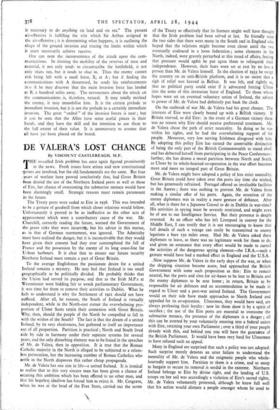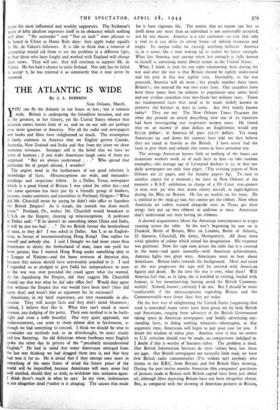DE VALERA'S LOST CHANCE
By VISCOUNT CASTLEREAGH, M.P.
THE so-called Irish problem has once again figured prominently in the news. Fresh issues have arisen and new constitutional -points are involved, but the old fundamentals are the same. But four .years of warfare have proved conclusively that, had Great Britain -been denied the use of the Northern Ireland ports as well as those of Eire, her chance of overcoming the submarine menace would have been alarmingly small. Strategic reasons must remain paramount in the future.
The Treaty ports were ceded to Eire in 1938. This was intended to be a gesture of goodwill from which closer relations would follow. Unfortunately it proved to be as ineffective as the other acts of appeasement which were a contributory cause of the war. Mr. Churchill, correctly reading the future, warned the Government of the grave risks they were incurring, but his advice in this matter, as in that of German rearmament, was ignored. The Admiralty must have realised the danger, but it is inconceivable that they would have given their consent had they ever contemplated the fall of France and the possession by the enemy of its long coast-line for U-boat harbours. It is clear that to ensure our future security Northern Ireland must remain a part of Great Britain.
To the average Englishman the passionate desire for a united Ireland remains a mystery. He may feel that Ireland is too small geographically to be politically divided. He probably thinks that the Union had served its purpose, and that as the Irish M.P.s at Westminster were bidding fair to wreck parliamentary Government, it was time for them to remove their activities to Dublin. What he fails to understand is why the Settlement of 1921 should not have sufficed. After all, he reasons, the South of Ireland is virtually independent, while in the North-east corner the overwhelming pro-' portion of Ulster Scots retain their connexion with Great Britain. Why, then, should the people of the North be compelled to fall in with the wishes of the South? The fact is that the dream of a united Ireland, by its very elusiveness, has gathered to itself an importance out of all proportion. Partition is practical ; North and South lived side by side in harmony under their separate systems for several years, and the only disturbing element was to be. found in the speeches of Mr. de Valera, then in opposition. It is true that the Roman Catholic majority in the North is alleged to be subjected to a relent- less persecution, but the increasing number of Roman Catholics who settle in the North disproves this rather cheap propaganda.
Mr. de Valera has one aim in life—a united Ireland. It is ironical to realise that to this very sincere man has been given a chance of securing this ambition which has been offered to no other man, and that his hopeless idealism has forced him to reject it. Mr. Cosgrave, when he was at the head of the Free State, carried out the terms
of the Treaty so effectively that its framers might well have thought that the Irish problem had been solved at last. So friendly were the two sides that there were many in the South and in England who hoped that the relation's might become even closer until the two eventually coalesced in a loose federation ; some elements in the North, indeed, were gravely perturbed at this trend of affairs, fearing that pressure would again be put upon them to relinquish their independence. However, their fears were set at rest by no less a person than Mr. de Valera himself. In the election of 1933 he swept the country on an anti-British platform, and it is no secret that a sigh of relief was heaved in Belfast. It was felt, and rightly so, that no political party could exist if it advocated forcing Ulster
into the arms of this inveterate hater of England. To those whose hopes were set on eventual voluntary union of Ireland, the advent to power of Mr. de Valera had definitely put back the clock.
On the outbreak of war Mr. de Valera had his great chance. The interests of Eire were clearly bound up with a British victory. If Britain starved, so did Eire : in the event of a German victory there was no reason why Eire should receive preferential treatment. Mr. de Valera chose the path of strict neutrality. In doing so he was within his rights, and he had the overwhelming support of his people. Moreover, very few serving Irishmen disagreed with him. By adopting this policy Eire has earned the unenviable distinction of being the only part of the British Commonwealth to stand aloof, and has debarred herself from participating in the Peace Conferences: further, she has drawn a moral partition between North and South, as Ulster by its whole-hearted co-operation in the war effort becomes more and more an integral part of Great Britain.
Mr. de Valera might have adopted a policy of less strict neutrality. Great Britain could have taken over the ports any time she wished, but has generously refrained. Portugal offered us invaluable facilities in the Azores ; there was nothing to prevent Mr. de Valera from making a similar offer of his ports. Again, the retention of the enemy diplomats was in reality a, mere gesture of defiance. After all, what is there for a Japanese Consul to do in Dublin in war-time? His activities in spying must be severely restricted, and might even be of use to our Intelligence Service. But their presence is deeply resented. As an officer who has left Liverpool in convoy for the Middle East, I can testify that it is not encouraging to know that full details of such a voyage can easily be transmitted to enemy legations a bare 15o miles away. Had Mr. de Valera asked these diplomats to leave, as there was no legitimate work for them to do, and given an assurance that every effort would be made to curtail the activities of the dangerous spying element—the I.R.A.—such a gesture would have had a marked effect in England and the U.S.A. . Now suppose Mr. de Valera in the early days of the war, or when the shipping situation became acute, had approached the British Government with some such proposition as this: Eire to remain neutral, but the ports and sites for air-bases to be lent to Britain and the enemy diplomats to be sent home ; in return, Britain to be responsible for air defences and an accommodation to be made in regard to Ulster and a post-war united Ireland. The Government would on their side have made approaches to North Ireland and appealed for its co-operation. Ulstermen, they would have said, are always professing their loyalty: now let them show it by a spirit of sacrifice ; the use of the Eire ports are essential to overcome the submarine menace, the presence of the diplomats is a danger ; all this can be averted by your voluntarily entering into a federal union with Eire, retaining your own Parliament ; over a third of your people already wish this, and behind you you will have the guarantee of the British Parliament. It would have been very hard for Ulstermen to have refused such an appeaL Many in England are surprised that such a policy was not adopted. Such surprise merely denotes an utter failure to understand the mentality of Mr. de Valera and the enigmatic people who whole- heartedly support him. Partition to them is a crime, and to stoop to bargain to secure its removal is sordid in the extreme. Northern Ireland belongs to Eire by divine right, and the landing of U.S. troops on her soil was accordingly a violation of Eire's sacred rights, Mr. de Valera vehemently protested, although he knew full well that his action would alienate a people amongst whom he used to count his most influential and wealthy supporters. The Irishman's spirit of lofty idealism expresses itself in an obduracy which nothing will alter. "No surrender " and "Not an inch " were phrases to be heard in Ulster in Home Rule days: they apply today equally to Mr. de Valera's followers. It is idle to think that a removal of censorship would aid them to see the problem in a different light, or that those who have fought and worked with England will change their views. They will not: they will continue to support Mr. de Valera. He has had a chance to unite Ireland. Not only has he failed to accept he has rejected it so summarily that it may never be repeated.



























 Previous page
Previous page